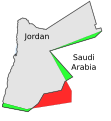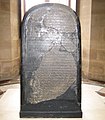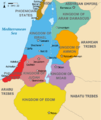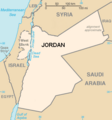Portal:Jordan
The Jordan Portal  Jordan, officially the Hashemite Kingdom of Jordan, is a country in the Southern Levant region of West Asia. Jordan is bordered by Syria to the north, Iraq to the east, Saudi Arabia to the south, and Israel and the occupied Palestinian territories to the west. The Jordan River, flowing into the Dead Sea, is located along the country's western border. Jordan has a small coastline along the Red Sea in its southwest, separated by the Gulf of Aqaba from Egypt. Amman is the country's capital and largest city, as well as the most populous city in the Levant. Modern-day Jordan has been inhabited by humans since the Paleolithic period. Three kingdoms emerged in Transjordan at the end of the Bronze Age: Ammon, Moab and Edom. In the third century BC, the Arab Nabataeans established their kingdom centered in Petra. Later rulers of the Transjordan region include the Assyrian, Babylonian, Roman, Byzantine, Rashidun, Umayyad, Abbasid, and the Ottoman empires. After the 1916 Great Arab Revolt against the Ottomans during World War I, the greater Syria region was partitioned, leading to the establishment of the Emirate of Transjordan in 1921, which became a British protectorate. In 1946, the country gained independence and became officially known as the Hashemite Kingdom of Jordan. The country captured and annexed the West Bank during the 1948 Arab–Israeli War until it was occupied by Israel in 1967. Jordan renounced its claim to the territory to the Palestinians in 1988 and signed a peace treaty with Israel in 1994. Jordan is a semi-arid country, covering an area of 89,342 km2 (34,495 sq mi) with a population of 11.5 million, making it the eleventh-most populous Arab country. The dominant majority, or around 95% of the country's population, is Sunni Muslim, with the rest being mostly Arab Christian. Jordan was mostly unscathed by the violence that swept the region following the Arab Spring in 2010. From as early as 1948, Jordan has accepted refugees from multiple neighbouring countries in conflict. An estimated 2.1 million Palestinian refugees, most of whom hold Jordanian citizenship, as well as 1.4 million Syrian refugees, were residing in Jordan as of 2015. The kingdom is also a refuge for thousands of Christian Iraqis fleeing persecution. While Jordan continues to accept refugees, the large Syrian influx during the 2010s has placed substantial strain on national resources and infrastructure. The sovereign state is a constitutional monarchy, but the king holds wide executive and legislative powers. Jordan is a founding member of the Arab League and the Organisation of Islamic Cooperation. The country has a high Human Development Index, ranking 99th, and is considered a lower middle income economy. The Jordanian economy, one of the smallest economies in the region, is attractive to foreign investors based upon a skilled workforce. The country is a major tourist destination, also attracting medical tourism with its well-developed health sector. Nonetheless, a lack of natural resources, large flow of refugees, and regional turmoil have hampered economic growth. (Full article...) Selected article -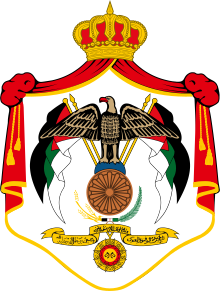 The Parliament of Jordan (Arabic: مجلس الأمة Majlis Al-Umma) is the bicameral Jordanian national assembly. Established by the 1952 Constitution, the legislature consists of two houses: the Senate (Arabic: مجلس الأعيان Majlis Al-Aayan) and the House of Representatives (Arabic: مجلس النواب Majlis Al-Nuwaab). The Senate has 69 members, all of whom are directly appointed by the king, while the House of Representatives has 138 elected members, with nine seats reserved for Christians, three are for Chechen and Circassian minorities, and fifteen for women. The members of both houses serve for four-year terms. (Full article...) Selected biography -Hussein bin Talal (Arabic: الحسين بن طلال, romanized: Al-Ḥusayn bin Ṭalāl; 14 November 1935 – 7 February 1999) was King of Jordan from 11 August 1952 until his death in 1999. As a member of the Hashemite dynasty, the royal family of Jordan since 1921, Hussein was a 40th-generation direct descendant of the Islamic prophet Muhammad. Hussein was born in Amman as the eldest child of Talal bin Abdullah and Zein Al-Sharaf. Talal was then the heir to his own father, King Abdullah I. Hussein began his schooling in Amman, continuing his education abroad. After Talal became king in 1951, Hussein was named heir apparent. The Jordanian Parliament forced Talal to abdicate a year later due to his illness, and a regency council was appointed until Hussein came of age. He was enthroned at the age of 17 on 2 May 1953. Hussein was married four separate times and fathered eleven children. (Full article...) WikiProjectFor editor resources and to collaborate with other editors on improving Wikipedia's Jordan-related articles, see WikiProject Jordan. General images -The following are images from various Jordan-related articles on Wikipedia.
Selected city -Azraq (Arabic: الأزرق meaning "blue") is a small town in Zarqa Governorate in central-eastern Jordan, 100 kilometres (62 mi) east of Amman. The population of Azraq was 9,021 in 2004. The Muwaffaq Salti Air Base is located in Azraq. (Full article...)
See also: List of cities in Jordan
Related portalsReligions in Jordan Arab states Other countries Recognized content
Featured articlesGood articles
TopicsSelected topic overview -
CategoriesSelected picture - The Karak Castle (c. 12th century AD) built by the Crusaders, and later expanded under the Muslim Ayyubids and Mamluks.
Associated WikimediaThe following Wikimedia Foundation sister projects provide more on this subject:
SourcesDiscover Wikipedia using portals |


